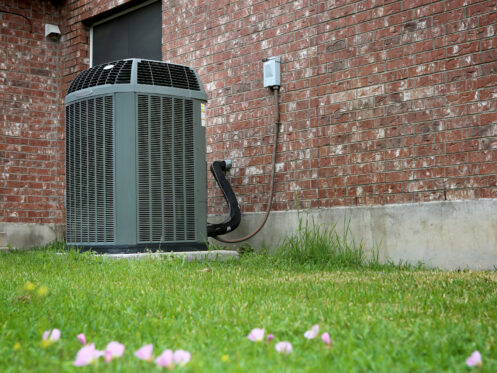One of the more common AC issues is that ice will start to form on the evaporator coil and cause the system to freeze up. It’s quite easy to tell when this happens since it will lead to hot air blowing out of your vents and the temperature in your home quickly starting to increase. In this article, we’ll discuss the various reasons that an AC system can freeze and also what steps you should take if it happens.
Most Common Reasons an AC System Will Freeze Up
Your AC system can potentially start freezing up as a result of several different issues, and the easiest way to prevent it from happening is to keep your AC properly maintained. In some situations, you may be able to fix the problem yourself while waiting for the system to thaw out. There are also a few other issues where you’ll need to have one of our AC technicians diagnose and fix whatever specific issue is causing the system to freeze. With that in mind, here is an overview of the various issues you may be facing and what role they play in causing an AC system to freeze.
Insufficient Airflow
Probably the most common reason that an AC system will freeze is that it doesn’t have sufficient airflow, and this is something you can check for by feeling to see how much air is blowing out of your vents. For an AC system to function correctly, there needs to be a constant flow of warm air coming into the system and blowing over the evaporator coil. Air conditioning works by capturing the heat from this warm air using a cold refrigerant liquid. This process also causes moisture in the warm air to condense when the air meets the cold evaporator coil.
The issue is if the airflow coming into the system is restricted or reduced for any reason, the refrigerant won’t capture nearly as much heat. When this happens, it often results in the evaporator coil being so cold that all of the condensation quickly starts to freeze until the coil is coated in a thick layer of ice.
One thing to check if you’re having issues with your AC frequently freezing is the air filter. The dirtier an air filter gets, the less air can flow through it. This is why we recommend replacing your filter every two to three months. It’s also important that you’re not using an air filter that is more efficient than your AC can handle. This is because higher efficiency filters are also extremely restrictive and have a similar effect as using a filter that’s overly dirty and clogged up.
The other thing we’d recommend checking while waiting for the system to thaw is that the supply vents in each room of your home are fully open and not clogged with debris or obstructed by anything. Closed or obstructed vents also interfere with airflow. The volume of warm air coming into an AC system and cold air blowing out of it always needs to be equal for the system to work properly. When some vents are closed or obstructed, the cold air quickly builds up inside the supply ducts. This, in turn, restricts the amount of warm air the blower can pull in through the return ducts and can eventually result in the evaporator coil beginning to freeze.
Another possible reason an AC system doesn’t have sufficient airflow is that the fan or blower motor is coated in dust or beginning to wear out. Either issue can result in the blower not being able to circulate sufficient air to prevent the system from freezing. Our technicians will usually check for both of these issues when troubleshooting your system to determine why it’s freezing.
Dirty Evaporator Coil
This issue is similar to the ones we previously discussed in that dirt and dust on the evaporator coil can interfere with the ability of the refrigerant to capture heat. What happens is that the dust acts like a layer of insulation that blocks the warm air from directly reaching the evaporator coil. Again, this can quickly lead to the coil getting so cold that the water on it freezes.
Cleaning the evaporator coil in your AC system is a job that should always be left to a professional. The main reason is that the coil is quite fragile. You could easily end up bending the fins on it or even poking a hole in it if you’re not extremely careful and don’t know exactly what you’re doing. A dirty evaporator coil is a common issue. It is one of the many reasons you should always have us service your AC system yearly. Our technicians will fully clean the evaporator and condenser coils in your outdoor AC unit to ensure the system works as efficiently as possible.
Low Refrigerant Charge
The final reason that an AC can freeze is that the refrigerant level m is too low. When an AC is low on refrigerant, the pressure in the system is also much lower. The lower the pressure is, the colder the refrigerant will get. If the pressure drops too low, the refrigerant will get so cold that the system constantly freezes up each time it runs.
The refrigerant in an AC system flows through a closed loop, which means the level should always stay the same. If it’s low, there is a leak in one of the coils or refrigerant lines. However, sometimes, a low refrigerant charge can also result from improper maintenance, which is why you should only ever have our certified technicians work on your AC system.
Why You Should Always Shut Off Your AC If It Freezes
If you put your hand near a vent and feel warm air coming out, you should immediately switch your thermostat to OFF so that your AC stops running. After shutting off your AC, you’ll then need to wait for however long it takes for all of the ice on the evaporator coil to melt. If there is lots of ice on the coil, all of the water dripping off it can sometimes cause the drain pan underneath the coil to overflow. As such, you may want to put a few towels on the ground around your air handler, just in case.
Allowing your AC to continue to run is just a waste of energy since it can’t cool when frozen and will just circulate hot air around your house. That said, the main reason you need to shut the system off is to ensure it doesn’t suffer damage.
The refrigerant in an AC system is a cold liquid when it gets pumped inside, but a warmer gas when it gets pumped back outside and into the compressor. When the system freezes, the refrigerant remains in a liquid state when it enters the compressor. If liquid refrigerant gets into the compressor, it can cause the oil that lubricates the compressor motor to start burning off. This can then lead to the motor not being sufficiently lubricated, which creates the potential for it to seize up and burn out. Replacing the compressor motor is by far the most expensive of all AC repairs.
You can count on F.F. Hitchcock Plumbing, Heating & Cooling for expert help if your AC keeps freezing or has any other issues. Our certified technicians can service and repair every AC make and model and quickly diagnose your system’s issue. As a leading home service company in the Cheshire area, you can trust us for all your air conditioning, heating, plumbing, and insulation needs. Contact us today if you need to get your AC inspected and maintenanced or to schedule any other service.








